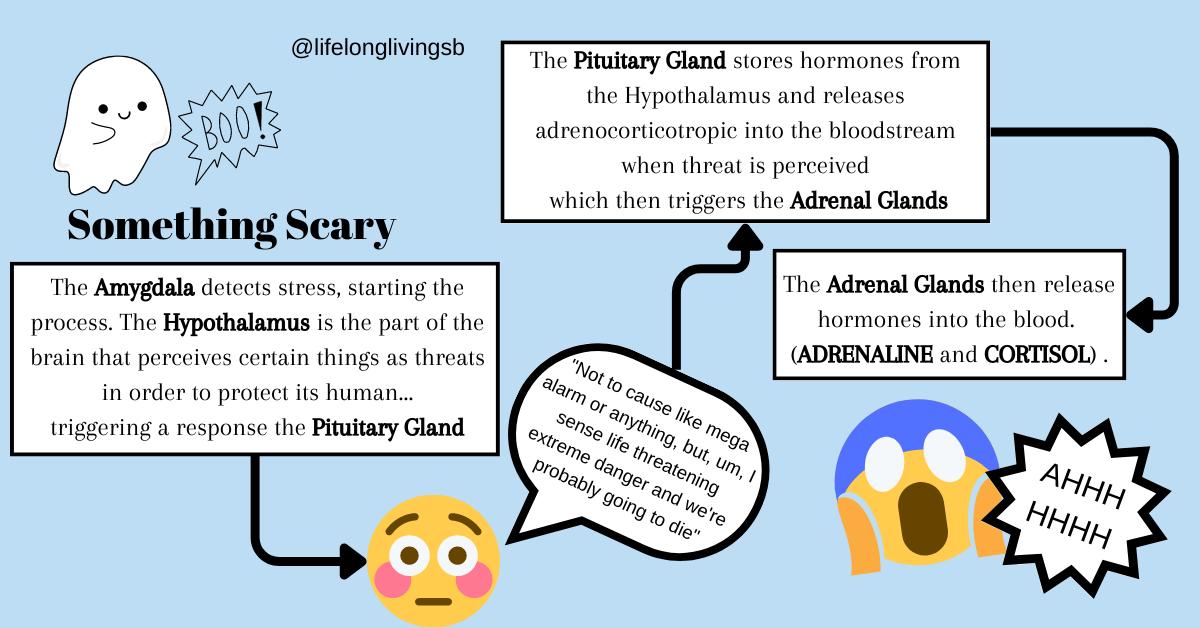AuthorSasha Baldeosingh, MSc. Mental Health Therapist at Lifelong Living Counselling Services Have you ever wondered why anxiety, panic, or trauma memories can make you feel dizzy, experience difficulty breathing, make you all sweaty, and even want to use the bathroom more often 😶? Understanding the autonomic nervous system and its impact on mental health could answer this question for you and help you take control of your body's reactions to stress. Click read more below.The sympathetic nervous system is a part of the autonomic nervous system which is a vital part of the human nervous system. It regulates our bodily functions such as heart rate, breathing, digestion, and blood pressure. This plays a significant role in our stress response which can impact our mental health and wellness. Understanding how the sympathetic system works and how it impacts anxiety, panic, and past trauma symptoms can be helpful for individuals trying to manage their symptoms. Sympathetic Nervous System and Anxiety and PanicThe sympathetic nervous system is responsible for that "fight or flight" response which prepares our bodies for perceived or real dangerous situations. When our brains perceive a threat, whether it be from an actual threat, something we learned to be a threat, or even just an idea of a threat, the sympathetic nervous system triggers a chain reaction of physiological responses to maximize the chances of survival. While this is useful is actual dangerous situations (such as being attacked or fleeing from a disaster), sometimes the brain can perceive non-dangerous things as threats as well (such as public speaking, taking an exam, or a social interaction). The reason why the brain might perceive these non-dangerous events as threats can be due to an incident in the past or even something that we heard that we feared was a threat to our survival. Now, a threat to survival in this case might be fear of being judged or embarrassed, fear of failure, etc. because somewhere in our lives we learned a belief that these things harm us. And, unfortunately, our brains cannot distinguish between an actual and perceived threat. With this chain reaction of physiological responses, our brains send signals to release stress hormones (cortisol and adrenaline) throughout our body to pump blood to our muscles, shorten our breathing, and quicken our heart rate because the brain wants the body to be ready to fight or run! The digestive system is not deemed important to survival so energy is spent on these other systems that are seen as necessary for survival. However, when there is no fight or no reason to run, these stress hormones linger in our bodies, creating an imbalance in our mental, emotional, and physical state. The "freeze" response is characterized by a feeling of being "stuck" or unable to move. Again, the brain is trying to protect the body in a time of danger (think: evolutionarily "playing dead" to not get eaten by a saber tooth tiger). If a person is feeling threatened by something, the brain might initiate the "freeze" response any time the individual feels uncomfortable or in danger as a means of protecting the individual. If not balanced, the "freeze" response can also create feelings of dissociation, numbness, or a feeling of detachment from one's body or surroundings. Sympathetic Nervous System and Past TraumaWhen someone has experienced a past trauma, another responses can come into play: the "fawn" response. This response can happen with anxiety and panic as well (think: nervous chatter or giggles), but is more commonly seen with individuals who have experienced past trauma. The "fawn" response involves a tendency to appease or submit to others in order to avoid conflict or harm. Individuals who exhibit the "fawn" response may be overly accommodating, have difficulty setting boundaries, or struggle with assertive communication. Many times, people who experience the "fawn" response were abused in some way and, in order to survive, tried to appease the abuser to prevent the abuser from hurting the individual. Somewhere along the way, the individual learned that using their voice or stating their opinions got them hurt. Why is it important to understand this?Understanding your body and what is happening when you are experiencing a difficult emotion can be empowering. It can help you gain back control of these situations instead of feeling like these experiences control you. For example, if you are feeling intense fear about going to a social gathering, with this knowledge about what is happening in your body and brain, you can understand, "Ok, something is making me feel threatened or unsafe here. What is it that my brain is perceiving as a threat? Is it fear of not knowing what to say? Am I afraid that I am going to embarrass myself?" With this exploration, it opens up possible solutions such as checking the facts or preparing yourself or making a plan to soothe these fears. Another possibility is that maybe there is someone who is going to be at the party who you feel uncomfortable with! And with that information, you can make more informed decisions for your wellbeing. Everyone's experience with the sympathetic nervous system and stress response is unique and influenced by individual factors such as genetics, past experiences, and current circumstances. Therefore, there is no one-size-fits-all solution when it comes to managing these experiences. However, by increasing our understanding of the sympathetic nervous system, we can become more attuned to our bodies and better equipped to manage our symptoms. This knowledge can also help reduce the stigma surrounding mental health challenges and encourage individuals to seek the help they need to heal and thrive. Remember, if you find yourself struggling with anxiety, panic, or past trauma, it's important to seek help from a mental health therapist to help guide you on the path to healing. Please note that the information provided in this post is not intended to serve as a substitute for professional medical or mental health advice, diagnosis, or treatment. Always seek the advice of your physician or other qualified healthcare provider with any questions you may have regarding a medical or mental health condition.
0 Comments
Leave a Reply. |
Lifelong Living Counselling Services
|
Sasha Baldeosingh, MSc
Mental Health Therapist |
Sign up for Monthly Newsletter |
Contact |
Quick Links |
© 2024 Lifelong Living Counselling Services. All rights reserved.



 RSS Feed
RSS Feed
